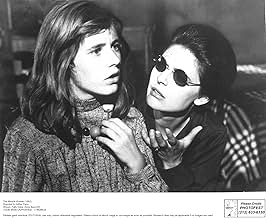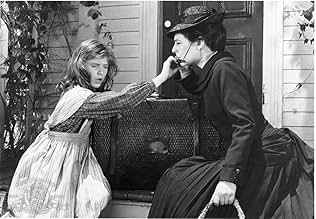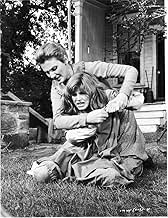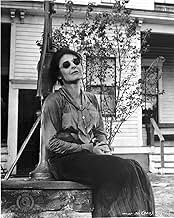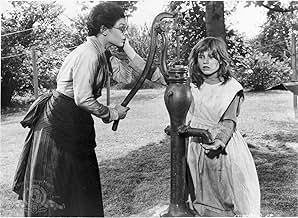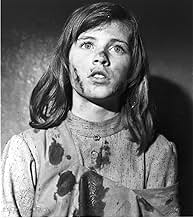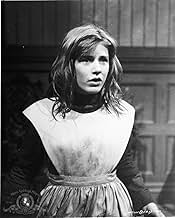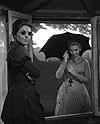The story of Anne Sullivan's struggle to teach the blind, deaf and mute child Helen Keller how to understand and communicate.The story of Anne Sullivan's struggle to teach the blind, deaf and mute child Helen Keller how to understand and communicate.The story of Anne Sullivan's struggle to teach the blind, deaf and mute child Helen Keller how to understand and communicate.
- Won 2 Oscars
- 13 wins & 13 nominations total
Maribel Ayuso
- Undetermined Role
- (uncredited)
Dale Ellen Bethea
- Martha at Age 10
- (uncredited)
John Bliss
- Admissions Officer
- (uncredited)
Grant Code
- Doctor
- (uncredited)
Michael Darden
- Percy at Age 10
- (uncredited)
Michele Farr
- Annie at Age 10
- (uncredited)
William F. Haddock
- 2nd Crone
- (uncredited)
Alan Howard
- Jimmie at Age 8
- (uncredited)
Judith Lowry
- 1st Crone
- (uncredited)
Helen Ludlam
- 3rd Crone
- (uncredited)
Beah Richards
- Viney - Keller Maid
- (uncredited)
Featured reviews
Arthur Penn's superb, emotionally devastating screen version of William Gibson's play about the early life of Helen Keller and of how a great dedicated teacher, Annie Sullivan, dragged her kicking, if not necessarily screaming, out of her world of darkness. Penn's style is spare and unsensational, (even finding a good deal of humour in the early encounters between teacher and pupil; deaf, dumb and blind Keller may be but she is as wily as a cat and runs rings round Sullivan). The black and white images are straightforward and uncluttered and have the power of the images in silent cinema. As Sullivan and Keller, Anne Bancroft and Patty Duke are both astonishing. There is a rapport between these two actresses that seems to transcend mere 'acting' and raises the film to an altogether higher, more deeply moving plain.
With two terrific leading performances, an absorbing and thought-provoking story, and many well-conceived touches by Arthur Penn and his production team, this classic version of "The Miracle Worker" is an exceptional movie that appeals to the imagination and that has much to say about humanity. The story itself is so good that even the lesser remakes have been worth seeing, but there is really no reason at all to look any further than this nearly flawless filming of the story.
As Annie Sullivan and Helen Keller, Anne Bancroft and Patty Duke could not have been better. The battle of wills and wits between the two is engrossing, becoming quite involved and very interesting. The lengthy dining room struggle alone would make any movie worth watching - it is worthwhile even beyond the interesting action itself, as it brings out aspects of human nature and human learning that go beyond even Helen's own trials.
There is a great deal of substance to the movie that goes beyond the immediate issues and confrontations, and a significant reason for the greatness of the film is the way that Bancroft and Duke tap into the imagination of the viewer. The concept of seeing an unseen world (and the challenge of helping someone to see it) is brought out in ways that are profound yet accessible.
The two leads carry almost the whole picture, as the other characters are there primarily for Annie and Helen to play off of. Accordingly, the supporting cast keep their characters more simple, and their performances stylized and almost exaggerated, which allows Bancroft and Duke to have most of the moments of significance. The production also enhances the picture through simple but well-conceived settings, use of lighting, and other features that nicely complement the main action.
It's always rather unfortunate that movies like this one, which take a little effort to appreciate fully, are not given more attention. If you stop to consider what Helen Keller had to face in life, it is a situation far more terrifying than facing any of the cartoonish, artificial movie villains that gain so much notoriety. And if you consider the job that Annie Sullivan had to do, her accomplishment is far more impressive and worthwhile than almost any scientific discovery, feat of athletics, or military exploit.
That this movie is able to convey such themes makes it a memorable classic that is much more worthwhile than many movies that have received far more acclaim.
As Annie Sullivan and Helen Keller, Anne Bancroft and Patty Duke could not have been better. The battle of wills and wits between the two is engrossing, becoming quite involved and very interesting. The lengthy dining room struggle alone would make any movie worth watching - it is worthwhile even beyond the interesting action itself, as it brings out aspects of human nature and human learning that go beyond even Helen's own trials.
There is a great deal of substance to the movie that goes beyond the immediate issues and confrontations, and a significant reason for the greatness of the film is the way that Bancroft and Duke tap into the imagination of the viewer. The concept of seeing an unseen world (and the challenge of helping someone to see it) is brought out in ways that are profound yet accessible.
The two leads carry almost the whole picture, as the other characters are there primarily for Annie and Helen to play off of. Accordingly, the supporting cast keep their characters more simple, and their performances stylized and almost exaggerated, which allows Bancroft and Duke to have most of the moments of significance. The production also enhances the picture through simple but well-conceived settings, use of lighting, and other features that nicely complement the main action.
It's always rather unfortunate that movies like this one, which take a little effort to appreciate fully, are not given more attention. If you stop to consider what Helen Keller had to face in life, it is a situation far more terrifying than facing any of the cartoonish, artificial movie villains that gain so much notoriety. And if you consider the job that Annie Sullivan had to do, her accomplishment is far more impressive and worthwhile than almost any scientific discovery, feat of athletics, or military exploit.
That this movie is able to convey such themes makes it a memorable classic that is much more worthwhile than many movies that have received far more acclaim.
I bought this movie after having not seen it for a while, and watching it again was intensely powerful. I had never cried during the "water" scene, but I did this time. The scene in the dining room is magnificently filmed and exhausting to watch...to think Patty Duke and Anne Bancroft performed that scene every night on Broadway! Supposedly they wore multiple layers of padding. I don't know why they didn't create a new category for the Oscars that year, Best Double Performance in Leading Roles. They both richly deserved the Oscars they won, but I really couldn't choose between a leading role and a supporting role in that movie since Duke and Bancroft created such a beautiful and moving partnership. Having read a great deal about Helen Keller, including her own autobiography, I am still always amazed by her story and accomplishments. This movie is a brilliant testament to human strength.
Where do I begin? Shall I speak of Mrs Bancroft's performance,one of the finest you can watch on a screen?Shall I tell about Patty Duke's tour de force?Shall I praise the mind-boggling work of Arthur Penn,directing the long fight around the table?This movie is a miracle in itself.Behind her dark spectacles,the teacher hides buried terrors,that's why she's bound to understand her unusual pupil.She knows that the solution to her problems lies in herself,that the family is a prison .The parents do not see(or do not want to see) that they erect a wall between their daughter and the world outside by poisoning her with protection.That's why Annie seems brutal,hard on Helen.She could not have broken the wall if she had been a "nice" teacher.Among all Penn's great movies ,"miracle worker" is the only one that has an optimistic end.Since,other directors have tackled autism(children of a lesser God,rain man)but no one has surpassed this black and white gem.
I'm not certain if it was fate but it is very interesting that I had the chance to finally see "The Miracle Worker" a few days after the sad news of the death of Anne Bancroft.
The film, based on the play by William Gibson, is an extremely well-acted film, brilliantly opened up on the big screen. Anne Bancroft as teacher Annie Sullivan and Patty Duke as young Helen Keller are outstanding. Sullivan's determination to communicate to the deaf and blind Helen made for a compelling story on stage as well as on screen.
I understand that when Hollywood wanted to make this movie, the powers-that-be did not want Bancroft or Duke. After finally seeing the movie, I'm glad that director Arthur Penn and producer Fred Coe chose to make this movie outside the so-called Hollywood establishment.
One scene that was discussed in some other posts was the dining room in which Sullivan forces Helen to eat food from a spoon and not her hands. It almost felt like I was watching a fierce wrestling match. It was a physical, as well as an emotionally draining, sequence. A battle of wills between teacher and the unwilling student. It was brilliantly edited and directed.
The film was not without faults. According to the IMDb, a number of flashback scenes were filmed in their entirety but did not work out very well. Those scenes were incorporated within the movie and it looked rather clumsy. The scenes could have been easily edited out completely.
As with all plays adapted to the big screen, some scenes were a little bit stagy. But that involved just a few scenes and, overall, it did not ruin the movie.
What I really liked about the movie was that the filmmakers were very successful at not succumbing to sentiment. This movie could have easily been very corny and sappy. Perhaps Bancroft and Duke and their performances had something to do with that.
I've been a fan of Anne Bancroft for many years and I'm very glad that I had the chance to see her well-deserved Oscar-winning performance.
RIP Ms. Bancroft.
The film, based on the play by William Gibson, is an extremely well-acted film, brilliantly opened up on the big screen. Anne Bancroft as teacher Annie Sullivan and Patty Duke as young Helen Keller are outstanding. Sullivan's determination to communicate to the deaf and blind Helen made for a compelling story on stage as well as on screen.
I understand that when Hollywood wanted to make this movie, the powers-that-be did not want Bancroft or Duke. After finally seeing the movie, I'm glad that director Arthur Penn and producer Fred Coe chose to make this movie outside the so-called Hollywood establishment.
One scene that was discussed in some other posts was the dining room in which Sullivan forces Helen to eat food from a spoon and not her hands. It almost felt like I was watching a fierce wrestling match. It was a physical, as well as an emotionally draining, sequence. A battle of wills between teacher and the unwilling student. It was brilliantly edited and directed.
The film was not without faults. According to the IMDb, a number of flashback scenes were filmed in their entirety but did not work out very well. Those scenes were incorporated within the movie and it looked rather clumsy. The scenes could have been easily edited out completely.
As with all plays adapted to the big screen, some scenes were a little bit stagy. But that involved just a few scenes and, overall, it did not ruin the movie.
What I really liked about the movie was that the filmmakers were very successful at not succumbing to sentiment. This movie could have easily been very corny and sappy. Perhaps Bancroft and Duke and their performances had something to do with that.
I've been a fan of Anne Bancroft for many years and I'm very glad that I had the chance to see her well-deserved Oscar-winning performance.
RIP Ms. Bancroft.
Did you know
- TriviaMark Twain was the first person to refer to Anne Sullivan as "the miracle worker". Twain was a friend of Helen Keller.
- GoofsAnnie Sullivan has to look up the word discipline in a dictionary later in the film even though she's used it in a letter near the beginning; however, she remarks that she must know how to spell it before teaching it to Helen, and may have simply used her best guess in the letter since nothing was at stake.
- Quotes
Annie Sullivan: Pity? For this tyrant? The whole house turns on her whims! Is there anything she wants she doesn't get? I'll tell you what I pity: that the sun won't rise and set for her all her life, and every day you're telling her it will! What good will your pity do when you're under the strawberries, Captain Keller?
- ConnectionsEdited into Histoire(s) du cinéma: Le contrôle de l'univers (1999)
- SoundtracksHush, Little Baby
(uncredited)
Traditional Southern lullaby
Music adapted by Don Costa
Lyrics by Arthur Siegel
Sung by Anne Bancroft
Also played in the score
Details
Box office
- Budget
- $500,000 (estimated)
- Gross worldwide
- $4,139
- Runtime
- 1h 46m(106 min)
- Color
- Sound mix
- Aspect ratio
- 1.85 : 1
Contribute to this page
Suggest an edit or add missing content



